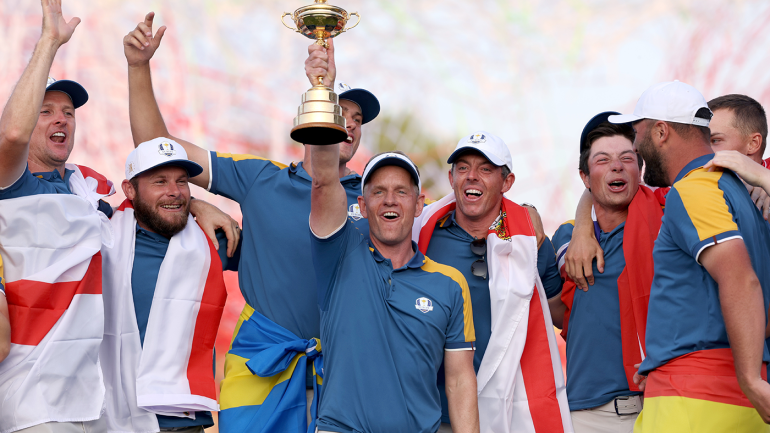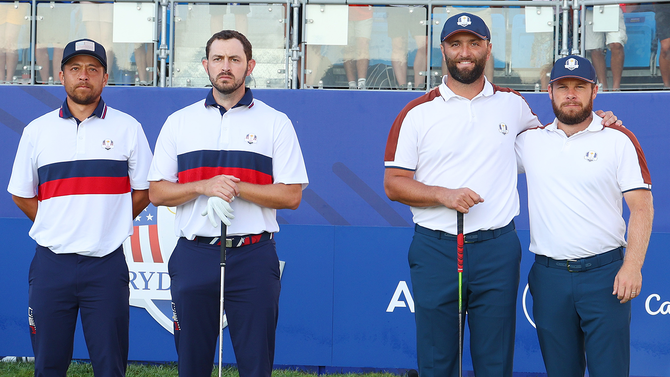
ROME -- There is a tremendous irony that the team comprised of players from nine nations is almost always more united during Ryder Cup weeks than the team comprised of players from one.
Those European players -- the ones from England, Scotland, Ireland, Northern Ireland, Sweden, Norway, Spain, Austria and Denmark -- beat the Americans 16.5 to 11.5 in a 2023 Ryder Cup that was actually closer than the score makes it appear. It was the latest in a long list of European victories at European Ryder Cups and a reminder that, though this event is ostensibly about golf, it's quite important to be adept at a lot of disciplines outside of it.
The goal of any team is harmony and solidarity. We often think this doesn't apply in golf because it's not usually a team sport. Even in the Ryder Cup, you're not passing the ball or handing it off. You're not playing pitch and catch with one another. It's still just you and the golf ball and your club and the flag. Even in alternate shot, there's nobody with you when it's your turn to play. So, it seems crazy to consider the galvanization of a team mattering at all.
However, there are plenty of scoreboards dotting places like Spain, France, Scotland and now Italy that would disagree.
"Thirty-five years, and they still think we're just overachieving!" yelled one European player as he jogged from the final green to the first tee to receive Europe's seventh consecutive Ryder Cup trophy on home soil.
In many ways, this was an accurate statement. We do think this. How in the world did these underdog fellas beat the mighty Americans once again?! This U.S. team was supposed to represent a new era and win the next five in a row!
When the European side includes possibly the three best active players in the world, I'm not sure they should be considered the underdogs their captain Luke Donald (or the oddsmakers) purported them to be. There was also the long American layoff, some captain's picks that got questioned, some pairings that really got questioned and (of course) the home crowd.
All of this matters, but all of it is window dressing to the real reason for the result: Europe played great, and the U.S. did not.
So, why did Europe play great?
Well, their top players showed up; Rory McIlroy, Jon Rahm and Viktor Hovland combined to go 9-2-3. Then the rest of the team did enough to get the Europeans to the 14.5 points they needed to reclaim the Ryder Cup. They chipped in and made crazy, ridiculous putts over and over and over again.
You cannot do this without being good at golf, but the fact that ridiculous moments -- Rahm chipping in from everywhere but the Vatican, 22-year-old Nicolai Hojgaard making seven birdies in a round, somebody playing Big 12 golf six months ago beating two major champions 9&7 -- continue to happen repeatedly in Europe is difficult to explain.
It may sound hokey and even silly to believe, but maybe when something completely defies explanation like what Europe does at home Ryder Cups, it's time to consider that all the emotional sit-around-the-fire pit camaraderie the Europeans have completely bought into actually does make a difference. Perhaps not among the best players, but certainly among those who the superstars are helping usher in to the greatest week of their lives. Maybe your stars removing their egos from the equation -- instead of their hats -- actually helps Bob MacIntyre or Ludvig Aberg believe in themselves. Perhaps this is a far greater edge than any course manipulation or analytical preparation into pairing creation.
Whether you believe any of this is meaningful when shots are in the air during a competition like this one is nearly irrelevant. Why? Because all 12 players on the European team believe it is.
"We are united by a culture, and we are united by a generation of players that have come before us," said Justin Rose in a press conference Sunday evening.
When the Americans lose on European soil as favorites -- seemingly a ritual at this point given it happened this year and in 2018 -- people like to pass the blame. We talk about what the U.S. players did wrong or what the captain could have done better. This is a very American viewpoint, of course, and only on the fourth or fifth or sixth consideration do we finally get to the legitimate answer: What if the Europeans just have all of this figured out?
Of course, you cannot out-emotion your way to Ryder Cup wins if you do not have the horses. The Euros proved this in 2016 at Hazeltine and 2021 at Whistling Straits. When it's close, though? It can absolutely provide an edge. And now the Europeans have 10 of the last 14 trophies to prove it.
This begs the question of how -- despite being spread out across an entire continent that contains myriad cultures and languages -- the Europeans gather under a banner of humility and seemingly become one organism for seven straight days. One of my favorite videos the Europeans put out all week had their players introducing themselves in their home country's dialect. It was so emotional and meaningful.
12 players. 12 winners. 1 team.#TeamEurope | #RyderCup pic.twitter.com/xHE5YI0dFI
— Ryder Cup Europe (@RyderCupEurope) October 1, 2023
So, how do you somehow maintain the distinctiveness and unity necessary for a team of so many parts to move as one? Rahm gave the perfect answer.
"It's the ability to walk through those doors and forget about who you are outside of this week," he said. "What you have done or what you may do afterwards really, truly doesn't matter."
That's kind of the whole thing right there, isn't it?
No matter what you believe about reports of Patrick Cantlay, his hat and his rumored desire to be paid for Ryder Cup appearances, it is clear that the Americans do not enter into the week like the Europeans. It's a foregone conclusion that all 12 Europeans will leave their egos at the door. The U.S. side? There are continually question marks. The only certainty seems to be uncertainty. They are making steps toward it -- I believe that some of them want to try and come together like the Euros -- but it's clear they have not established the necessary long arc of culture.
Those Euros have a hell of a head start on something that takes decades to build.
Why is it so much more difficult for the Americans to play as a completely unified group? Well, it starts with total buy-in from your top players. They have to care so much about the culture and the week that they do not care about looking foolish. The U.S. certainly does not seem to have that.
There is a moment from the 2016 Ryder Cup I think about all the time. The U.S. had just won its first Ryder Cup in eight years, and Rory was running around telling them to celebrate, stop putting on airs and let go a little bit. It was this bizarre moment where it legitimately seemed like the Americans were scared to sing and dance and spray champagne. It was also emblematic.
I can promise you, nobody had to tell the Europeans to celebrate Sunday afternoon.
There was Rory, sprinting up the 18th fairway, jumping into the arms of Shane Lowry, who was actually playing the 18th hole. There was Rose, running into a throng of European officials and family members, screaming at them before popping the champagne. They were all hugging and kissing and wrapping flags around one another's necks.
Two scenes stand out from this last week.
On Friday afternoon, with the leaderboard reading red and the Americans threatening to reenter the tournament, Rahm and Hovland put a dagger in the day and effectively ended the week with monstrous putts at the last. I'll never forget standing next to Lowry, who started running up and down the 18th fairway and at one point fell on his back and screamed into the Roman heat.
Lowry is not afraid to look like a fool, and while there's no statistic for this, you will never be able to convince me that it doesn't contribute to a winning attitude in a week like this. And more importantly, you'll never be able to convince any of the Euros otherwise.
The second scene came at the first tee Saturday.
There were Cantlay & Xander Schauffele looking miserable and like they wanted to be anywhere else in the world. And there were Rahm & Tyrrell Hatton literally hugging and holding onto one another.
You will never convince me that image doesn't matter, either.
I'm aware I could be wrong about this. Perhaps you can win a Ryder Cup on the road with 12 individuals doing their own thing. This is the United States' new strategy: just let us treat this like a normal event. That worked at home in 2021, but I'm not sure it works when you have 40,000 lunatics screaming in your face. Again, it took a tweet about a hat to give them a cause to rally around this week. The Europeans never need anything other than their culture.
When the question, "How do these guys keep playing their best golf in the biggest moments at this event?" is posed and the answer from another journalist is, "I don't know man, it's in the ether!" well, I'm forced to believe that that image matters because "intangibles that lead to unreasonable success" and "magic" often look the same.

"I think culture is huge," said McIlroy. "We take the piss out of each other. We have a sense of humor. We don't take ourselves too seriously. I think that's a big part of it, too. We feel like we can be ourselves. There's a real good sense of humor in the team. You know, sometimes it's hard because you're within a group, and they are making fun of you, but you're getting made fun of in a good way and it's appreciated and everyone has been good sports.
"We're caretakers of this European jersey right now, and we're hopefully going to pass it on in the future in a better spot than where we found it."
Imagine an American saying that.
The Europeans have solved the riddle. It's not 35 years of overachieving; it's 35 years of culture building. That may only work on the road occasionally (Europe has won two of the last five in the U.S.) because winning on the road is an extremely difficult proposition, but it will almost always work at home (where Europe has won seven straight). This year was evidence of it.
But even in losing weeks, understanding how a Ryder Cup team is supposed to work makes the Euros so much more likable than the Americans. They did not bail on this ethos when they lost in 2016 nor 2021. Even when they lose, they're easy to love because of their joy. Winning seems to be almost a byproduct, perhaps even incidental.
Winning is obviously the point of the competition, but Europe has proved again in victory what it showed last time in defeat: Playing for yourself and your own country is important, but it cannot compare in either power or delight to what it means to truly play for someone else.





















